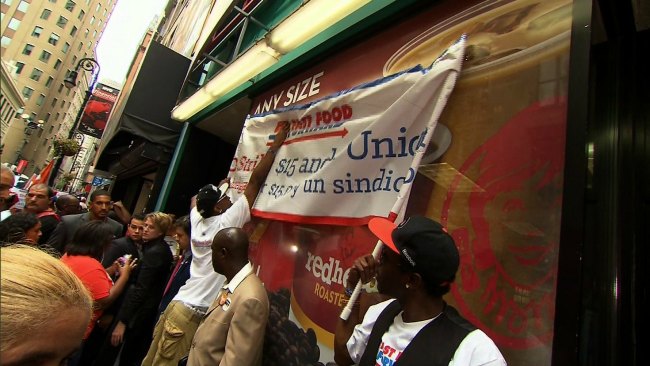 The mainstream media has had difficulty understanding the eruption of strikes in the fast food industry. They have acted as if they have come out of nowhere and for no apparent reason. Neither is true.
The mainstream media has had difficulty understanding the eruption of strikes in the fast food industry. They have acted as if they have come out of nowhere and for no apparent reason. Neither is true.The strikes in the fast food industry are the result of intolerable wages and working conditions faced by a workforce that has become increasingly dependent on this sector of the economy in order to survive. Today’s fast food industry is a bit different from days of old. The jobs in fast food are no longer being held exclusively by teenagers and 20-plus who are in school looking for some extra money. As the economy has reorganized and older workers have been thrown out of full-time employment, the fast food industry has become a location one step away from unemployment and homelessness for many workers of various ages.
The strikes, which were initiated by organizing conducted by a project of the Service Employees International Union, have become a front-line in the battle against the polarization of wealth in the U.S. Specifically, these are fights over the immediate necessity to raise the minimum wage. Fast food workers are generally kept at substandard wages and have to piece together various part-time jobs (much like workers in retail). They have few, if any, benefits and do not know from one day to the next whether they actually have a job that will last for any significant duration.
The fast food strikes have come to resemble the movement for the 8-hour day from the 19th century. In that case, workers undertook strikes, demonstrations and other forms of protest – including the strikes that led to the creation of May Day as “International Workers Day” – in order to demand that there be a shorter workweek with no cut in pay. Today’s fast food workers are making an analogous demand: they want a livable wage
Fast food workers are fighting the good fight not only for themselves but for other vulnerable workers. They know that their conditions will not improve by bargaining a contract one fast food outlet at a time, but that instead there needs to be a governmental raise in the minimum wage and, frankly, there need to be industry standards to which all fast food—and retail—outlets are held. This will happen if and only if there is a continuous outpouring of public support, much of which has already occurred.
Thus, these actions are being conducted by some very courageous workers of all ages who have decided that they have had enough. They need to know that you are backing them up.
Bill Fletcher, Jr. is the chairman of the Retail Justice Alliance which supports workers in the retail industry fighting for fairness. He is also a Senior Scholar with the Institute for Policy Studies, the immediate past president of TransAfrica Forum and the author of “They’re Bankrupting Us” – And Twenty Other Myths about Unions. He can be followed on Facebook and www.billfletcherjr.com.
